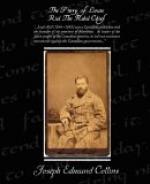DR. ROY, of the Beauport Asylum, Quebec, said the prisoner was an inmate of that institution for nineteen months. He was discharged in January, 1878. He suffered from ambitious mania. One of the distinguishing characteristics of that form of insanity is that, so long as the particular hobby is not touched, the patient appears perfectly sane. From what he heard the witnesses say, and from the prisoner’s actions yesterday, he had no hesitation in pronouncing the man insane, and he believed him not to be responsible for his acts.
DR. CLARKE, of Toronto, was the next witness. He said he was the Superintendent of the Toronto Lunatic Asylum. He has had nine or ten years’ experience in treating lunatics. He examined the prisoner twice yesterday and once this morning. From what evidence he had heard and from his own examination, provided the witnesses told the truth and the prisoner was not malingering, there was no doubt of his being insane.
Cross-examined by Mr. Osler—It is impossible for any man to say that a person like Riel, who is sharp and well-educated, is either insane or sane. He (the witness) would require to have him under his notice for months to form an opinion. The man’s actions are consistent with fraud. Thinks he knows the difference between right and wrong, subject to his delusion.
DR. WALLACE was next called. He said he was Superintendent of the Insane Asylum at Hamilton. He had listened to the evidence in this case. He saw the prisoner alone for half an hour. He has formed the opinion that there is no indication of insanity about him. He thinks the prisoner knows the difference between right and wrong. The person suffering from megalomania often imagines he is a king, divinely inspired, has the world at his feet—supreme egotism in fact. It is one of the complications of paralytic insanity.
DR. JUKES, of the Mounted Police, would not say the prisoner was not insane. He had seen him daily since May, and noticed no traces of insanity.
The Court adjourned at five o’clock.
RIEL’S ADDRESS TO THE JURY.
At the outset, writes W. A. H., correspondent of the Montreal Star, Riel spoke in a quiet and low tone, many of his statements carrying home conviction to his hearers. “At any rate,” was the subsequent comment, “Riel speaks with the belief that he is right.” Gradually as he proceeded and got fairly launched into his subject, his eyes sparkled, his body swayed to and fro as if strongly agitated, and his hands accomplished a series of wonderful gestures as he warmed up and spoke with impassioned eloquence. His hearers were spell-bound, and well they might, as each concluding assertion with terrible earnestness was uttered with the effect and force of a trumpet blast. That every soul in Court was impressed is not untrue, and many ladies were moved to tears. The following is an epitome of what he said:—




